For EU-Turkey relations, 2017 has been an annus horribilis. On both sides, calls for ending Turkey’s EU membership process are mounting. Most recently, President Recep Tayyip Erdoğan called on his supporters in Germany to vote for fringe parties at the upcoming elections on September 24 to punish Turkey’s so-called “enemies.” Chancellor Angela Merkel and leader of the Social Democratic Party Martin Schulz—as well as the leaders of the Greens—have all become increasingly critical of Erdoğan’s repressive and authoritarian politics, and Merkel and Schulz bitterly objected to what they framed as Erdoğan’s blatant interference in German domestic affairs.
Merkel then upped the ante by calling for the suspension of negotiations to upgrade the customs union with Turkey. But the original customs union was not just a regular trade agreement that permitted European and Turkish industrial goods to be exchanged freely. Once the EU made its ratification conditional on Turkey adopting an initial set of democratic reforms, conditionality became a defining feature of EU-Turkish relations. This helped Turkey continue with reforms once it became an EU candidate country in 1999. Employing the principle of conditionality with the upgrading of the customs union could become a formula for recovering some of the democratic gains lost to rising authoritarianism in Turkey. A stronger customs union would benefit both sides, which need each other more than ever to manage a wide range of complex issues, from trade to counterterrorism and migration flows.
Unlikely circumstances
When the customs union was first established in the mid-1990s, Turkey’s relations with Germany and the European Union were strained and Turkish democracy was the object of immense criticism from the trans-Atlantic community—similar to today in some ways.
The early and mid-1990s were marked by violence between the Kurdistan Workers’ Party (PKK) and Turkish security forces, leading to massive displacement of Kurds in southeastern Turkey. Rampant human rights violations—including the imprisonment of Kurdish deputies and complete disregard for freedom of the media—prompted bitter criticism from Europe and the United States. Germany and the United States refused to sell Leopard II tanks and Cobra helicopters to Turkey, aggravating Turkey’s relations with NATO as well.
The political climate was so foul that a May 1995 visit by three female Members of the European Parliament, affiliated with Germany’s Green Party, infuriated then-State Minister Ayvaz Gökdemir, who famously remarked: “Turkey will never bend to pressure from these hookers.”
Nevertheless, the EU and Turkey initiated and completed negotiations to adopt the customs union early in 1995. The European Parliament’s ratification of the agreement was contingent on early political reforms in Turkey, which Ankara undertook. In June 1995, for instance, Turkey amended its constitution to expand political participation by removing several limitations on political party membership and decreasing voting age to 18. In October 1995, the Turkish Counterterrorism Law was amended to extend freedom of speech by switching previous jail sentences to pecuniary punishment and dropping the proposed jail time for terror charges.
Thus, the early introduction of conditionality helped set Turkey on a reform course. It eventually paved the way for Turkey to become an EU candidate country and start accession talks in 2005. The deal was not just about boosting trade and economic benefits—rather, it had concrete (and positive) political implications for Turkey.
What did it achieve?
While the customs union was being debated in the early- and mid-1990s, some in Turkey expressed protectionist concerns. Many argued that Turkish industry wouldn’t be able to compete with European counterparts, for instance. Left-leaning former Prime Minister Bülent Ecevit once argued that the customs union would turn Turkey into a “market for Europeans” without much benefits for Turks; Turks, in return, would become no more than “gardeners” for them, he was reputed to have added.
But two decades later, the customs union is generally recognized to have contributed significantly to Turkey’s transformation from an agrarian to an industrial economy and urban society. In the last two decades, Turkey’s trade with the EU increased four-fold, making Turkey the fifth largest exporter to the EU in 2016. The EU also benefits from the customs union, as Turkey receives 4.5 percent of exports from the EU, ranking it as the fourth-largest importer from the EU—just below the United States, China, and Switzerland, but ahead of larger economies such as Japan, South Korea, and India.
The liberalization of foreign trade that the customs union also boosted Turkey’s competitive power in the global economy as the country became integrated into global value chains via technical and regulatory alignment with the EU acquis—the body of EU regulations that permit market harmonization. Between 1996 and 2016, Turkey’s exports to the rest of the world increased by almost five-fold, and the share of foreign trade in the country’s GDP increased from 35 percent in 1995 to almost 50 percent in 2016.
What is often overlooked is that the customs union also helped Turkey take the initial steps towards democratization, and created dynamics and constituencies with an interest in democratic reform as well as help expand the middle class in the country. Without this spark, it is doubtful that Turkey would have improved its democratic credentials and expanded its democratic constituencies enough to be able to start EU membership negotiations, or become recognized as a “market economy.” Turkey became a model for countries aspiring to transition to democracy and a liberal market economy—thereby enhancing the EU’s transformative soft power in its neighborhood. Lastly, the customs union unintentionally became a successful migration policy tool, converting Turkey from an emigration to an immigration country. By the second half of the 2000s, there were more people migrating from Europe to Turkey than vice-versa, as Turkey became an attractive destination for European business people, students, professionals, and retirees, not to mention tourists. Furthermore, the booming Turkish economy attracted migrants from neighboring countries as well as individual asylum seekers that otherwise might have been destined for the EU.
To break or not to break relations?
The picture today is very different, and the current Turkish leadership does not have its heart set on a democratic, liberal, and economically booming Turkey anymore. In hindsight, the Gezi Park incidents in 2013 and the subsequent wave of arrests and repression were a critical turning point. The collapse of peace talks with the PKK in July 2015 brought back scenes reminiscent of the ugly days of the mid-1990s. Furthermore, the emergency rule introduced after the coup attempt in July 2016 and the highly contested adoption of constitutional amendments aiming to further centralize power in the hands of Erdoğan have continued to undermine Turkey’s democracy. That led the Council of Europe to put Turkey back on its monitoring list. These developments, together with the populist and religious nationalist narrative adopted by Turkey’s leaders—going as far as calling measures by some European political leaders Nazis—lie at the heart of today’s mutual recriminations.
Granted, the calls by Merkel and Germany’s Minister of Foreign Affairs Sigmar Gabriel for freezing financial assistance to Turkey as a part of the EU pre-accession package—as well as suspending negotiations to deepen the customs union—may serve domestic political interests. Yet it is not evident that this would help to improve EU-Turkish relations, let alone salvage them. Instead, a more constructive approach would be the one adopted by European Commission President Jean Claude Juncker, who has advocated for the continued engagement of Turkey in spite of his overall opposition to Turkey’s EU membership bid. Rather than risking a complete breakdown in EU-Turkish relations by suspending customs union negotiations, modernization discussions should be seen as an opportunity to re-capture the dynamism that happened on both sides.
What’s at Stake
Studies suggest that upgrading the customs union to cover trade in agricultural goods, services, and government procurement would increase Turkey’s GDP by 2.5 percent, along with 95 percent increase in agricultural exports to the EU and up to a 430 percent increase in the country’s services exports. This would also enable Turkey to benefit from the same advantages that the EU is extending to countries with which it is signing new generation free trade agreements (FTAs), such as Canada, Japan, Korea, Morocco, Tunisia, Georgia, and Ukraine.
It would also enable Turkey to resolve some of its long-standing grievances related to the current customs union, such as undertaking the EU’s Common Commercial Policy, which permits countries that have FTAs with the EU to access the Turkish market without reciprocal benefits for Turkish exports unless a separate bilateral FTA is in force. More importantly, an upgraded customs union would help boost foreign direct investment and promote innovation in Turkey, while also helping Turkey adapt to the increasing digitalization of the global economy.
The upgraded customs union could hence catalyze the growth of Turkey’s competitive power and push the country above the “middle income trap.” Still, such a transformation will not take place unless it is accompanied by political reforms. Several members of the Turkish government recognize this—such as Deputy Prime Minister Şimşek, who has emphasized the need for Turkey to maintain its progress on the road to EU integration—and major business associations such as TÜSİAD.
The EU has a stake in this too: It is economic as well as political. An impact study by the European Commission lays out the economic gains for the EU, including a significant increase in EU exports to Turkey and a welfare gain of 5.4 billion euros. EU companies would also gain non-discriminatory access to Turkish government’s procurement market, and EU service providers (the service sector constitutes 73.4 percent of the Euro area economy) would benefit from a liberalized services market in Turkey. More importantly, starting negotiations would once more create a constructive momentum and allow stakeholders to support the successful completion of the negotiations. In such a climate, it would become easier to re-visit the need for political reforms before ratifying a deal, as Turkey will have become engaged in the project and become more committed to the pending benefits of an upgraded customs union.
The original customs union broke a vicious circle of recriminations and replaced it with an impressively virtuous one. There is no reason why it should not work once more, and if it does indeed work, it would be a win-win for the EU, Turkey, and Turkey’s troubled neighborhood. At a time when the world is facing ever growing challenges, salvaging EU-Turkish relations would be a welcome step towards addressing them and protecting the international liberal order.
The opposite scenario—that is, punishing Turkey for domestic political gains at home—will only strengthen Erdoğan’s hand, perpetuate his politics, and generate further regional instability and volatility, while pushing the country even closer to Russia and Iran. The United States, as a long-standing ally of Turkey and a country with a huge stake in the rule-based world order, should replicate what it did in the 1990s and help the EU and Turkey rise out of the rut they now find themselves in by advocating for negotiating an upgraded customs union.
The Brookings Institution is committed to quality, independence, and impact.
We are supported by a diverse array of funders. In line with our values and policies, each Brookings publication represents the sole views of its author(s).

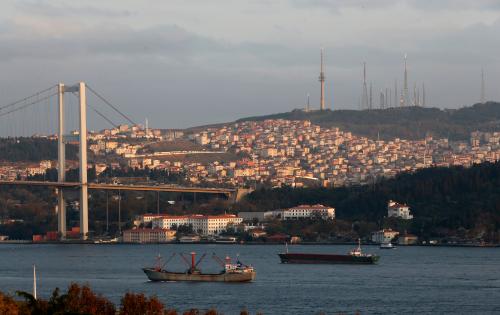
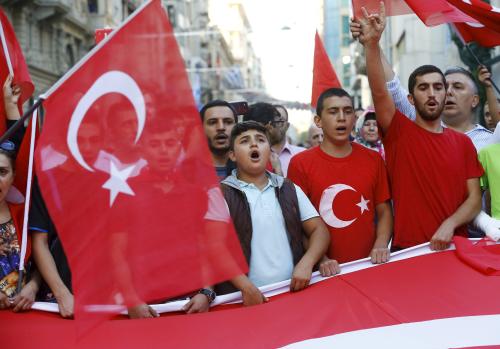
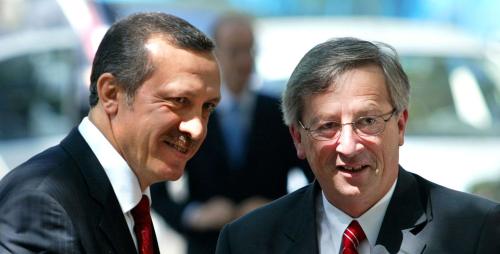


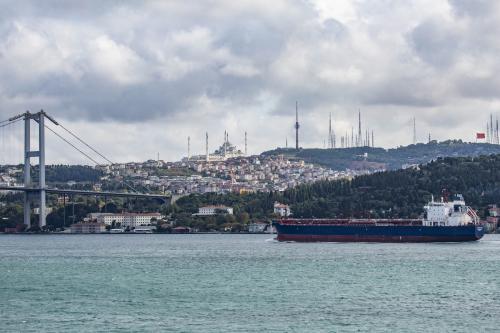
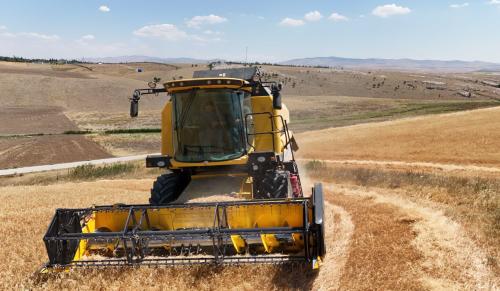
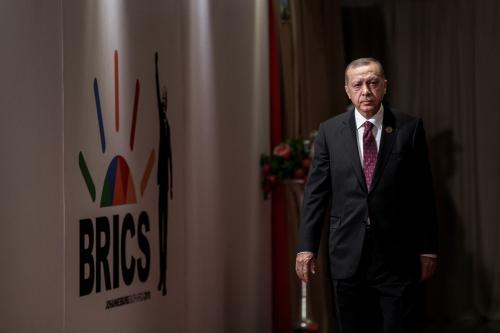
Commentary
The EU and Turkey need each other. Could upgrading the customs union be the key?
August 29, 2017